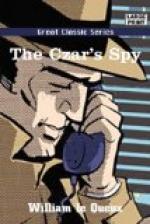“I should think this is the gentleman, sir,” he said. And he read to me the entry as follows:
“P.C. 462A reports that at 2.07 a.m., while
on duty outside the National Gallery, he heard a revolver
shot, followed by a man’s cry. He ran to
the corner of Suffolk Street, where he found a gentleman
lying upon the pavement suffering from a serious shot-wound
in the chest and quite unconscious. He obtained
the assistance of P.C.’s 218A and 343A, and the
gentleman, who was not identified, was taken to the
Charing Cross Hospital, where the house-surgeon expressed
a doubt whether he could live. Neither P.C.’s
recollect having noticed any suspicious-looking person
in the vicinity.
“JOHN
PERCIVAL, Inspector.”
I waited for no more, but rushed round to the hospital in the cab, and was, five minutes later, taken along the ward, where I identified poor Jack lying in bed, white-faced and unconscious.
“The doctor was here a quarter of an hour ago,” whispered the sister. “And he fears he is sinking.”
“He has uttered no words?” I asked anxiously. “Made no statement?”
“None. He has never regained consciousness, and I fear, sir, he never will. It is a case of deliberate murder, the police told me early this morning.”
I clenched my fists and swore a fierce revenge for that dastardly act. And as I stood beside the narrow bed, I realized that what Olinto had said regarding my own peril was the actual truth. I was a marked man. Was I never to penetrate that inscrutable and ever-increasing mystery?
CHAPTER XVII
THE TRUTH ABOUT THE “LOLA”
Throughout the long night I called many times at the hospital, but the reply was always the same. Jack had not regained consciousness, and the doctor regarded his case as hopeless.
In the morning I drove in hot haste to Bassett Road, Notting Hill, and at the address Olinto had given me found Muriel. When she entered the room with folding doors into which I had been shown, I saw that she was pale and apprehensive, for we had not met since her flight, and she was, no doubt, at a loss for an explanation. But I did not press her for one. I merely told her that the Italian Santini had given me her address and that I came as bearer of unfortunate news.
“What is it?” she gasped quickly.
“It concerns Captain Durnford,” I replied. “He has been injured in the street, and is in Charing Cross Hospital.”
“Ah!” she cried. “I see. You do not explain the truth. By your face I can tell there is something more. He’s dead! Tell me the worst.”
“No, Miss Leithcourt,” I said gravely, “not dead, but the doctors fear that he may not recover. His wound is dangerous. He has been shot by some unknown person.”
“Shot!” she echoed, bursting into tears. “Then they have followed him, after all! They have deceived me, and now, as they intend to take him from me, I will myself protect him. You, Mr. Gregg, have been in peril of your life, that I know, but Jack’s enemies are yours, and they shall not go unpunished. May I see him?”




